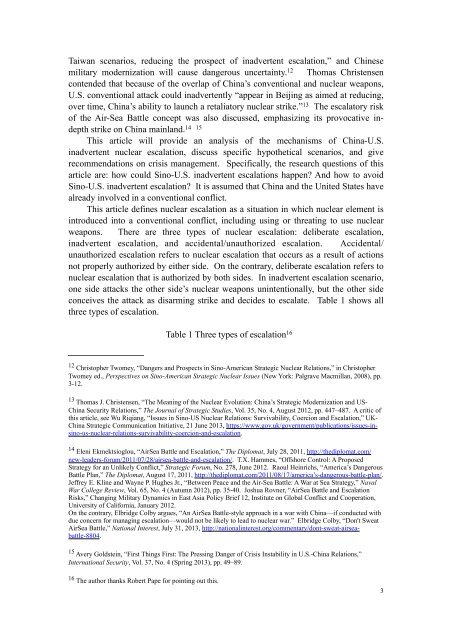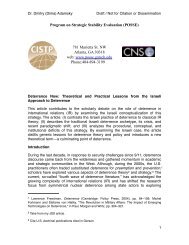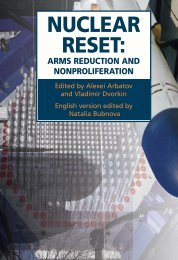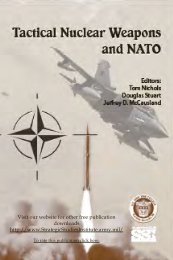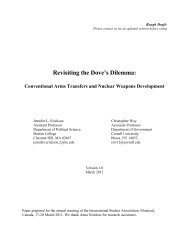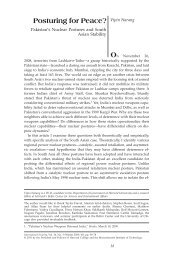Wu Sino US Inadvertent Escalation - Program on Strategic Stability ...
Wu Sino US Inadvertent Escalation - Program on Strategic Stability ...
Wu Sino US Inadvertent Escalation - Program on Strategic Stability ...
You also want an ePaper? Increase the reach of your titles
YUMPU automatically turns print PDFs into web optimized ePapers that Google loves.
Taiwan scenarios, reducing the prospect of inadvertent escalati<strong>on</strong>,” and Chinese<br />
military modernizati<strong>on</strong> will cause dangerous uncertainty.<br />
12<br />
Thomas Christensen<br />
c<strong>on</strong>tended that because of the overlap of China’s c<strong>on</strong>venti<strong>on</strong>al and nuclear weap<strong>on</strong>s,<br />
U.S. c<strong>on</strong>venti<strong>on</strong>al attack could inadvertently “appear in Beijing as aimed at reducing,<br />
over time, China’s ability to launch a retaliatory nuclear strike.”<br />
13<br />
The escalatory risk<br />
of the Air-Sea Battle c<strong>on</strong>cept was also discussed, emphasizing its provocative indepth<br />
strike <strong>on</strong> China mainland.<br />
14 15<br />
This article will provide an analysis of the mechanisms of China-U.S.<br />
inadvertent nuclear escalati<strong>on</strong>, discuss specific hypothetical scenarios, and give<br />
recommendati<strong>on</strong>s <strong>on</strong> crisis management. Specifically, the research questi<strong>on</strong>s of this<br />
article are: how could <str<strong>on</strong>g>Sino</str<strong>on</strong>g>-U.S. inadvertent escalati<strong>on</strong>s happen? And how to avoid<br />
<str<strong>on</strong>g>Sino</str<strong>on</strong>g>-U.S. inadvertent escalati<strong>on</strong>? It is assumed that China and the United States have<br />
already involved in a c<strong>on</strong>venti<strong>on</strong>al c<strong>on</strong>flict.<br />
This article defines nuclear escalati<strong>on</strong> as a situati<strong>on</strong> in which nuclear element is<br />
introduced into a c<strong>on</strong>venti<strong>on</strong>al c<strong>on</strong>flict, including using or threating to use nuclear<br />
weap<strong>on</strong>s. There are three types of nuclear escalati<strong>on</strong>: deliberate escalati<strong>on</strong>,<br />
inadvertent escalati<strong>on</strong>, and accidental/unauthorized escalati<strong>on</strong>. Accidental/<br />
unauthorized escalati<strong>on</strong> refers to nuclear escalati<strong>on</strong> that occurs as a result of acti<strong>on</strong>s<br />
not properly authorized by either side. On the c<strong>on</strong>trary, deliberate escalati<strong>on</strong> refers to<br />
nuclear escalati<strong>on</strong> that is authorized by both sides. In inadvertent escalati<strong>on</strong> scenario,<br />
<strong>on</strong>e side attacks the other side’s nuclear weap<strong>on</strong>s unintenti<strong>on</strong>ally, but the other side<br />
c<strong>on</strong>ceives the attack as disarming strike and decides to escalate. Table 1 shows all<br />
three types of escalati<strong>on</strong>.<br />
<br />
Table 1 Three types of escalati<strong>on</strong><br />
16<br />
! 12 Christopher Twomey, “Dangers and Prospects in <str<strong>on</strong>g>Sino</str<strong>on</strong>g>-American <strong>Strategic</strong> Nuclear Relati<strong>on</strong>s,” in Christopher<br />
Twomey ed., Perspectives <strong>on</strong> <str<strong>on</strong>g>Sino</str<strong>on</strong>g>-American <strong>Strategic</strong> Nuclear Issues (New York: Palgrave Macmillan, 2008), pp.<br />
3-12.<br />
! 13 Thomas J. Christensen, “The Meaning of the Nuclear Evoluti<strong>on</strong>: China’s <strong>Strategic</strong> Modernizati<strong>on</strong> and <str<strong>on</strong>g>US</str<strong>on</strong>g>-<br />
China Security Relati<strong>on</strong>s,” The Journal of <strong>Strategic</strong> Studies, Vol. 35, No. 4, August 2012, pp. 447–487. A critic of<br />
this article, see <str<strong>on</strong>g>Wu</str<strong>on</strong>g> Riqiang, “Issues in <str<strong>on</strong>g>Sino</str<strong>on</strong>g>-<str<strong>on</strong>g>US</str<strong>on</strong>g> Nuclear Relati<strong>on</strong>s: Survivability, Coerci<strong>on</strong> and <str<strong>on</strong>g>Escalati<strong>on</strong></str<strong>on</strong>g>,” UK-<br />
China <strong>Strategic</strong> Communicati<strong>on</strong> Initiative, 21 June 2013, https://www.gov.uk/government/publicati<strong>on</strong>s/issues-insino-us-nuclear-relati<strong>on</strong>s-survivability-coerci<strong>on</strong>-and-escalati<strong>on</strong>.<br />
! 14 Eleni Ekmektsioglou, “AirSea Battle and <str<strong>on</strong>g>Escalati<strong>on</strong></str<strong>on</strong>g>,” The Diplomat, July 28, 2011, http://thediplomat.com/<br />
new-leaders-forum/2011/07/28/airsea-battle-and-escalati<strong>on</strong>/. T.X. Hammes, “Offshore C<strong>on</strong>trol: A Proposed<br />
Strategy for an Unlikely C<strong>on</strong>flict,” <strong>Strategic</strong> Forum, No. 278, June 2012. Raoul Heinrichs, “America’s Dangerous<br />
Battle Plan,” The Diplomat, August 17, 2011, http://thediplomat.com/2011/08/17/america’s-dangerous-battle-plan/.<br />
Jeffrey E. Kline and Wayne P. Hughes Jr., “Between Peace and the Air-Sea Battle: A War at Sea Strategy,” Naval<br />
War College Review, Vol. 65, No. 4 (Autumn 2012), pp. 35-40. Joshua Rovner, “AirSea Battle and <str<strong>on</strong>g>Escalati<strong>on</strong></str<strong>on</strong>g><br />
Risks,” Changing Military Dynamics in East Asia Policy Brief 12, Institute <strong>on</strong> Global C<strong>on</strong>flict and Cooperati<strong>on</strong>,<br />
University of California, January 2012.<br />
On the c<strong>on</strong>trary, Elbridge Colby argues, “An AirSea Battle-style approach in a war with China—if c<strong>on</strong>ducted with<br />
due c<strong>on</strong>cern for managing escalati<strong>on</strong>—would not be likely to lead to nuclear war.” Elbridge Colby, “D<strong>on</strong>'t Sweat<br />
AirSea Battle,” Nati<strong>on</strong>al Interest, July 31, 2013, http://nati<strong>on</strong>alinterest.org/commentary/d<strong>on</strong>t-sweat-airseabattle-8804.<br />
! 15 Avery Goldstein, “First Things First: The Pressing Danger of Crisis Instability in U.S.-China Relati<strong>on</strong>s,”<br />
Internati<strong>on</strong>al Security, Vol. 37, No. 4 (Spring 2013), pp. 49–89.<br />
! 16 The author thanks Robert Pape for pointing out this.<br />
! 3


